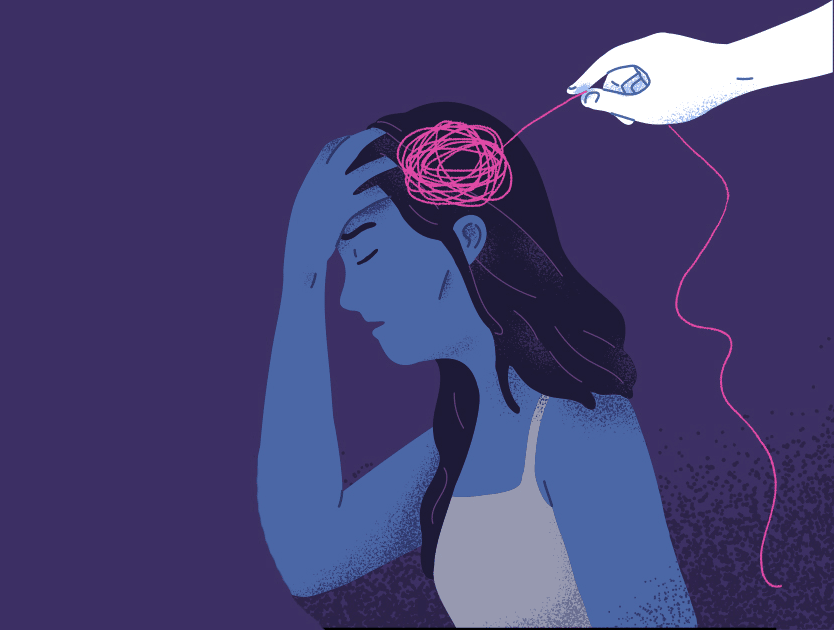Speak to a Care Coordinator Today
[contact-form-7 id="553" title="landing page header form"]
Teen Anxiety
Experiencing occasional anxiousness is a normal part of growing up. However, when anxiety becomes chronic and overwhelming, it can interfere with your teen’s development and daily life in significant ways.
Teen anxiety and depression are at an all-time high. This age group is particularly susceptible to developing anxiety disorders due to the many stressors and changes they experience during this time.
It is now the most common mental health disorder in the United States, affecting 40 million people of all ages. According to the National Institute of Mental Health, around 31.9% of children aged 13 to 18 experience mental illness every year.
Types of Anxiety
According to the National Institute of Mental Health (NIMH), there are several different types of anxiety disorders that teenagers may experience. These include:
- Generalized Anxiety Disorder (GAD)
- Social Anxiety Disorder (SAD)
- Separation Anxiety Disorder
- Obsessive-Compulsive Disorder (OCD)
- Panic Disorder
- Post-Traumatic Stress Disorder (PTSD)

Causes of Anxiety
According to Mayo Clinic, the causes of this disorder in teenagers are vast and varied. Below are the risk factors most commonly associated with it in teenagers:
- Trauma can be a significant cause of anxiousness in teenagers, including anything from physical or sexual abuse to the death of a loved one.
- Bullying is another common cause in teenagers. Those affected may feel isolated, insecure, and self-conscious.
- Family history becomes a factor if the disorder is common in your family, as there is a higher risk that your teen will develop it.
- Chemical imbalances will often trigger anxiety due to chemical imbalances in the brain. These imbalances might be the result of genetics or the environment.
- Stressful life events are commonplace for teens, such as moving, starting a new school, or going through puberty. For some teens, this can lead to increased anxiety levels.
- Stress due to illness. When a teenager is dealing with a chronic disease or health issue, it can be very stressful and increase anxiety levels.
- Appearance and body image. Teens often feel a great deal of pressure to look and act a certain way, leading to anxiousness and insecurity.
- Stress buildup. If a teen is constantly under pressure, it can build stress and aggravate anxiety disorders.
Teen Depression

Sadness, low energy, and fatigue are all normal human experiences, especially for teens going through emotional and hormonal changes. When those low moods begin to prevail over other emotions and affect your teen’s day-to-day life, however, it’s a sign that there may be something more serious going on.
Depression is one of the most common mental illnesses teens and adults feel. It can happen for many reasons and varies in severity from person to person. Like all mental illnesses, we can take some measures to reduce the severity.
Teen depression makes it much more challenging to navigate the adolescent years and the challenges that accompany them; therefore, it’s essential to become familiar with the characteristics of depression so that you can support your teen through their difficult times.
Subtypes of Teen Depression
Underneath the umbrella of depression, there are different types of depression that can impact teenagers in unique ways.
- Major Depression
- Persistent Depressive Disorder
- Bipolar Disorder
- Seasonal Affective Disorder (SAD)
Causes of Depression in Teens
Generally, the causes of depression fall under three main categories: biological, behavioral, and psychological.
Biological factors may include a family history of depression, problems with the way your brain functions, and certain medical conditions. For example, people who have low serotonin levels (a chemical in the brain) are more likely to experience depression. Family members of people with depression are also more likely to develop the disorder.
Behavioral factors may include negative life events (such as a death in the family or a breakup), poor coping skills, and social isolation. The impact of negative or traumatic events can be especially strong in teens because their brains are still developing.
Psychological factors may include low self-esteem, negative thinking patterns, and distorted views of reality. For example, someone with low self-esteem may think they are not good enough or worthless. Negative thinking patterns can make it difficult to see the positives in life, leading to depression.
Teen Personality Disorders
Personality disorders are conditions that affect the way a person thinks, feels, and behaves. They are usually categorized as either “internalizing” or “externalizing.” Internalizing disorders involve negative emotions such as anxiety and depression while externalizing disorders involve more destructive behaviors such as aggression and violence.
For teenagers, personality disorders can be especially destructive. Being an adolescent already poses challenges enough, but things can get really complicated when a personality disorder is thrown into the mix. Teens with personality disorders may have difficulty forming healthy relationships, managing their emotions, and succeeding in school or work.
If your teen struggles with a personality disorder, the best thing you can do is to become educated about the disorder and seek help from a therapist or counselor.

Subtypes of Personality Disorders
Beneath the umbrella term “personality disorder” lies a range of specific diagnoses that capture the way someone behaves and relates to the world. There are three clusters of personality disorders:
- Cluster A (odd or eccentric behavior)
- Cluster B (dramatic, emotional, or erratic behavior)
- Cluster C (anxious or fearful behavior)
Causes of Personality Disorders in Teens
- Genetics: Some believe that personality disorders may be passed down from parents to their children. This seems to be especially true for borderline personality disorder, which may have a genetic link.
- Environmental influences: Traumatic life events, such as abuse or neglect, can play a role in the development of personality disorders. So can being raised in an unstable or chaotic home environment.
- Brain chemistry: The brains of people with personality disorders may function differently than those without them. This could be due to differences in brain structure or the way neurotransmitters (chemical messengers in the brain) work.
- Life experiences: People with personality disorders may have had more negative life experiences than those without them. This could be due to the environmental and genetic factors mentioned above, or it could be that people with personality disorders are more prone to seeking out difficult or dangerous situations.
We accept Insurance and Cash Payments
We work with most Insurance Companies in hopes of ensuring the opportunity to help as many families as possible. If you want to discuss our affordable and competitive cash payment options, or if your policy is not listed below, there’s still hope, so please call our team now so we can conduct an Insurance verification.
- Cigna
- Aetna
- Beacon
- Geha
- Anthem
- Blue Cross Blue Shield
- Harvard Pilgrim
- Sanford Health Plan
- Multiplan
- Horizon
- Cigna
- Aetna
- Beacon
- Geha
- Anthem
- Blue Cross Blue Shield
- Harvard Pilgrim
- Sanford Health Plan
- Multiplan
- Horizon
[contact-form-7 id="84" title="footer form"]

Hillside Horizon for Teens
Canyon Lake, CA 92587
[block id="social-share"]
